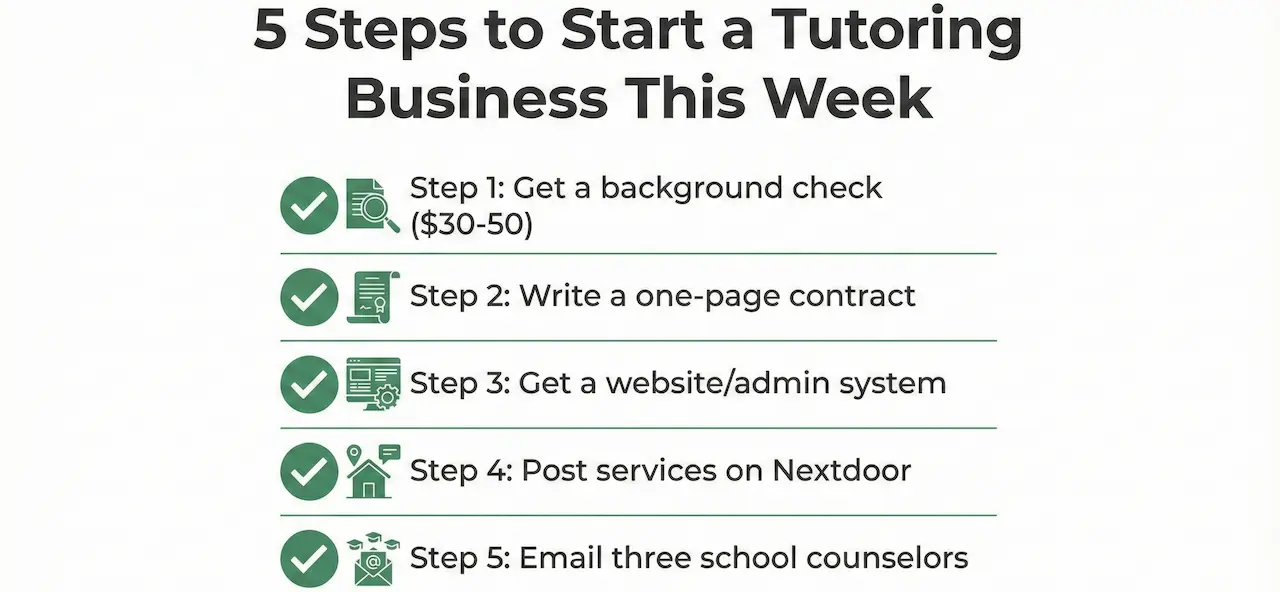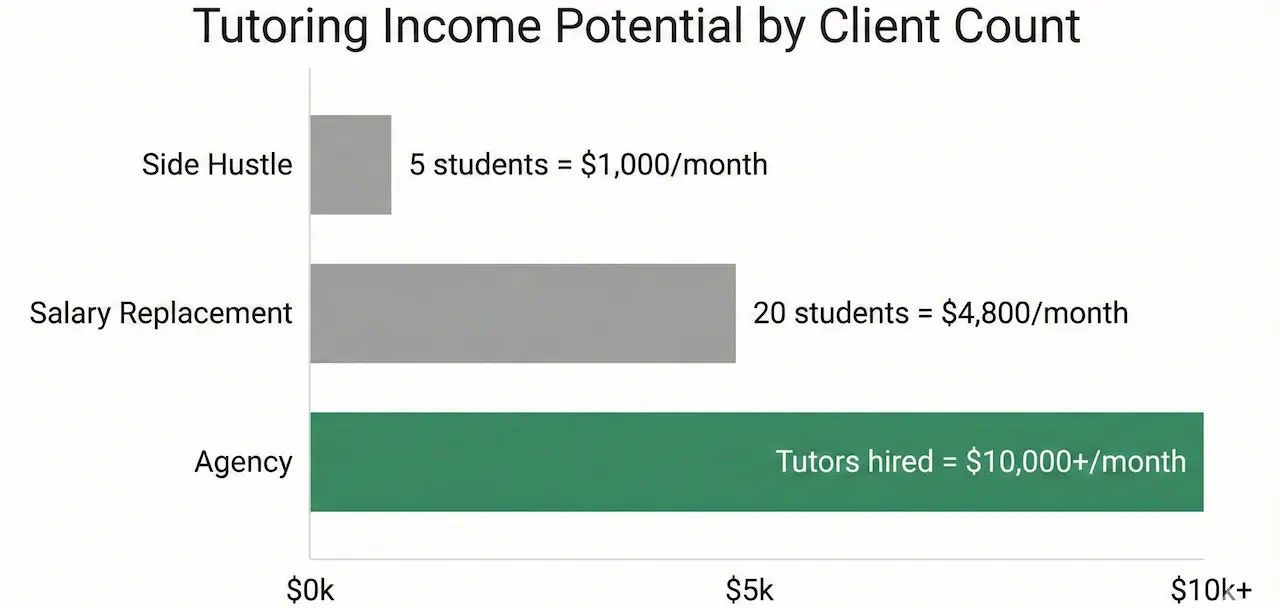You can start a tutoring business this week for under $200:
- Get a background check ($30-50)
- Write a one-page contract
- Get a website that also handles admin
- Post your services on Nextdoor
- Email three school counselors
You'll charge $50-80 per hour. You keep 80-90% as profit. Your only major cost is time. Ten students at $60/hour meeting weekly equals $2,400 per month.

Parents don't hire the cheapest tutor. They hire the one they trust most.
You already have subject expertise. Maybe you've even taught before. What you need now is proof you're safe with kids, a system to handle admin and make you look professional, and pricing packages that make you money.
Why start a tutoring business now?
The demand for tutoring services is high in 2026. Learning loss from pandemic disruptions created educational gaps that haven't closed yet. College admissions anxiety keeps climbing. Parents are desperate for experts they can trust with their child's future. They're willing to pay premium rates for tutors who feel safe, professional, and effective.
Is a tutoring business profitable?
Yes, tutoring delivers 80-90% profit (the amount of money you keep). Your main cost is time — not materials, inventory, or equipment.
One student paying $60 per hour for four sessions monthly brings in $240. Ten students at that rate equals $2,400 per month. Twenty students pushes you past $4,800 monthly. This turns your tutoring business from side income into salary replacement.
Tutoring income potential
When you own a tutoring business, income potential varies by subject and delivery method.
Math and science tutors typically get $50-80 per hour. Demand is high and qualified tutors are scarce. Humanities and language tutors usually see $40-60 per hour.
Test prep (SAT, ACT) can push rates to $80-120 per hour. In-person sessions command a 20-30% premium over online-only work. Parents value the personal connection and the accountability it brings.
You can start a tutoring business as a side hustle while keeping your day job. Five students at $50 per hour meeting weekly gives you $1,000 extra per month. Fifteen to twenty weekly sessions gets you to $3,000-4,000 monthly. That's enough to consider going full-time.

A major pro of starting a tutoring business is that you're not competing on price. You're competing on trust. Parents don't choose the cheapest tutor. They choose the one who makes them feel confident their child is safe and will improve.
Step 1. Design your tutoring business model: service delivery and pricing
The standard model for a tutoring business in 2026 is hybrid. That means mostly online tutoring sessions with strategic in-person meetings. You could run an entirely online tutoring business, but you won’t be able to charge as much.
Online vs. in-person services
Online gives you consistency. Students can meet with you twice weekly without driving across town. In-person gives you connection. You get the initial meeting where you build rapport. You get quarterly check-ins to reinforce progress.
For example, meet Sarah on Tuesday afternoon at a coffee shop for your first session. Spend 90 minutes assessing where she's struggling with algebra. Build rapport. Then continue Thursday and Saturday online for focused practice sessions. Four weeks later, meet in person again. Review her test results, give her feedback, and adjust your approach.
This combination lets you serve more students more consistently. You don't burn out driving all over the city. But you maintain the personal touch that justifies premium rates.
How to price your tutoring services
Stop selling hours. Start selling outcomes.
Most new tutors charge by the hour. It feels simple. But hourly rates create the wrong dynamic. You're incentivized to move slowly. Parents watch the clock instead of focusing on results. Try semester packages or monthly retainers instead.

A semester package might look like this: 24 sessions (2 per week for 12 weeks) for $1,320. That breaks down to $55 per session. But it feels like a commitment to real progress instead of a transaction. You get predictable income. Parents get a structured plan. The student gets consistency.
Monthly retainers work the same way. Charge $480 for four weekly sessions. Bill on the first of the month. Parents pay for access and accountability, not just time.
Tutoring rates by subject and format:
Subject area | Online only | Hybrid (online + in-person) | In-person only | Premium (test prep) |
Math | $40-50/hour | $50-70/hour | $60-80/hour | $80-120/hour |
Science | $40-50/hour | $50-70/hour | $60-80/hour | $80-120/hour |
English/Writing | $35-45/hour | $45-60/hour | $50-65/hour | $70-100/hour |
Foreign Language | $35-45/hour | $45-60/hour | $50-65/hour | N/A |
Test Prep (SAT/ACT) | $60-80/hour | $80-100/hour | $90-120/hour | $100-150/hour |
Source: Tutors.com
Tutoring package pricing example:
Package type | Sessions | Total price | Per-session cost | Client saves |
Pay per session | 1 | $60 | $60 | $0 |
Monthly (4 sessions) | 4 | $220 | $55 | $20 |
Semester (24 sessions) | 24 | $1,320 | $55 | $120 |
Tutoring business pricing formula and philosophy
Connection + Convenience + Results = Premium rates
Parents will pay $70-80 per hour when you deliver all three. They'll hesitate at $40 when you only offer one. Hybrid delivery gives you connection. Online sessions give them convenience. Your expertise and their child's improvement give them results.
Price based on the value of the outcome, not your perceived worth. A student getting into their target college because you helped them jump 200 points on the SAT is worth thousands of dollars to that family. Your $2,000 test prep package is a bargain.
Cancellation policy
Start with clear boundaries. Use a 24-hour cancellation policy — or they forfeit the session. No makeup sessions for student no-shows. Payment due before each month begins.
These policies aren't mean. They're professional. They protect your time and ensure commitment from your clients.
Step 2. Set up your legal and trust structure
When starting a tutoring business, your biggest asset isn't your degree. It's not your years of experience. It's proof you're safe to be alone with someone's child. Trust is your product — not just teaching skill.
Get a background check
A background check is one of the most important tutoring business legal requirements in most places (though check your local rules). Even if it’s not a requirement where you live, you should still get it. It's the single fastest way to remove doubt from a parent's mind.
Services like Checkr or Sterling cost $30-50. They take 2-3 business days. Display that badge on your website. Mention it in every conversation. "I maintain an active background check" is a sentence that closes deals.
If you're in the UK, get your DBS (Disclosure and Barring Service) check. If you're working with vulnerable populations or in certain states, you may need additional clearances.
Write a simple one-page contract
Your tutoring business contract can be one page. It should cover:
- Session frequency
- Cancellation policy
- Payment terms
- What happens if someone wants to pause or end the arrangement
You're not trying to trap anyone. You're avoiding awkward money conversations later.
Example cancellation clause: "Sessions must be cancelled with 24 hours notice. Late cancellations or no-shows forfeit that session's fee." Put it in writing before you start sonNo one feels surprised when you enforce it.
Get general liability insurance
If you're meeting students in your home or traveling to theirs, you need coverage in case someone gets hurt.
A slip-and-fall at your house could cost you everything without it. So could a car accident on the way to a session. Policies run $300-600 annually through providers like The Hartford or Hiscox.
Choose your business structure
You don't need an LLC on day one of starting a tutoring business. Operating as a sole proprietor is fine when you're testing the concept with your first few students. You'll report income on Schedule C of your personal tax return.
Once you're earning $2,000+ monthly or hiring other tutors, form an LLC for liability protection. It separates your personal assets from business risk. If a parent sues over a contract dispute, they're suing the business entity, not you personally.
LLC formation costs $50-200 depending on your state. It takes about an hour online.
Get a business license from your local city or county. Most jurisdictions require one for any paid services. The fee is usually $50-150 annually. Check your city's website or call the business licensing office.
Open a separate business bank account
Keep your tutoring income and expenses away from your personal spending. It makes taxes simpler. It looks more professional when parents see checks or transfers coming from "Smith Tutoring LLC" instead of your personal account.
Step 3. Build your "trust hub”: professional tutoring business website and brand
Parents Google “tutoring business near me” you before they call. If you don't have a website, they assume you're not serious. If your website looks amateur or incomplete, they assume your tutoring will be too.
You need a trust hub — a single place where parents can:
- See your credentials
- Understand your approach
- Review your safety clearances
- Book a session
A Facebook page won't cut it.

6 key elements of a tutoring business website
Your website needs five elements:
About page with credentials
Your teaching experience, degrees, certifications, subject specialties. Include a professional photo. Write in first person — this is personal work.
"I've taught high school chemistry for eight years and helped 200+ students improve their grades by at least one letter" beats a resume dump.
Safety badges
Display your background check status front and center. If you have teaching credentials or relevant certifications, show those too. Parents are evaluating risk before they're evaluating quality.
Your packages and pricing
Be specific. "Monthly Math Mastery: 4 weekly sessions for $280" beats "Contact for pricing." Transparency builds trust. Parents want to know if they can afford you before they reach out.
Clear booking process
Don't make them guess what to do next. "Schedule a free 15-minute call" or "Email me to check availability" gives them a concrete action.
Include your phone number and email address prominently. If you use a scheduling tool, embed the calendar directly on your site so parents can see your open slots without extra clicks.
Proof of results
Testimonials if you have them. Before-and-after grade improvements. The story of the student who went from a C to an A. Specifics matter more than generic praise.
Logo
A simple, professional logo makes your tutoring business look established, even on day one. It goes on your website header, business cards, flyers, and email signature.

Use it everywhere parents see your name. Consistent branding signals you're serious about your business.
Durable’s AI website builder can build a complete, branded tutoring business website in 30 seconds. You just have to provide answers to three questions: Your subject areas, your location, who you serve. It will include sections for credentials, safety badges, package pricing, booking, and proof. There’s even a free logo generator.
Everything you need to look professional without paying to hire a developer or graphic designer.
You’ll also get invoicing and customer relationship management (CRM) tools to help you run your business from the same dashboard. Spend less time juggling logins and subscriptions to different tools. Start booking students today.
Step 4. Get your first 5 clients: marketing for tutors
Marketing is often the hardest part of starting a tutoring business.
You may not be a natural salesperson. You're a teacher. The idea of selling yourself probably makes you uncomfortable. Good news: you don't have to be pushy to find tutoring clients.
You just need to show up where parents are already looking for help. Position yourself as the trustworthy expert.
Post on Nextdoor
Post in your neighborhood's education section: "Former math teacher offering tutoring for middle and high school students. Background-checked, 10 years of classroom experience. Hybrid model — first session in-person to build rapport, then flexible online sessions for consistency. Happy to answer questions." Include your website link.
This works because you're a neighbor first and a service provider second. Parents trust recommendations from people in their community. You're not cold-calling. You're introducing yourself to people who already share your zip code.
Reach out to school counselors and teachers
Send a short email: "Hi, I'm [Name], a former [subject] teacher now offering private tutoring in [area]. I know you work with students who need extra support outside the classroom. I'd love to be a resource you can refer to families. My website has more information."
Don't ask them to hire you. Ask them to remember you exist when a parent asks for tutor recommendations. School staff won't recommend someone who feels salesy. But they'll gladly pass along a qualified teacher who made it easy.
Print 100 simple flyers and distribute locally
One page. Your name, subject areas, "background-checked," your website, and your phone number. Put them on community boards at libraries, coffee shops, and grocery stores. Hand them to neighbors. Leave a small stack at the school front office.
If one parent calls, you've paid for a year of marketing. Printing costs $15 at FedEx Office.

Join local Facebook groups
Don't spam. When someone posts "Does anyone know a good chemistry tutor?" respond with: "I tutored chemistry for five years — happy to chat about what you're looking for." Be helpful first.
Set up a Google Business Profile
This is non-negotiable. Set it up today. It's free. When parents search "math tutor near me," you show up. This is local SEO — making sure you appear in Google search results for people in your area.
Add your website, phone number, service area, hours, and photos.Choose the right categories: "Tutor," "Private Tutor," or your specific subject like "Math Tutor." Fill out every field completely. Google ranks complete profiles higher than partial ones.
Ask your first few clients to leave reviews.Reviews are the biggest factor in local search rankings. More positive reviews mean you show up higher when parents search for tutors. Respond to every review—even short thank-yous show you're engaged.
1-month goal
Your goal for the first month of owning a tutoring business: five paying students. That's $200-400 weekly depending on your rates. It's proof the model works. It's enough income to justify spending time on this instead of questioning whether anyone will hire you.
Step 5. Set up automated admin
You started a tutoring business to teach. Not to manage spreadsheets and chase down payments. Set up systems now that eliminate admin work before it piles up.
Automated scheduling
Use a calendar tool that lets students book directly without the back-and-forth. "What time works for you?" "Tuesday?" "Actually I have soccer" "How about Thursday?" wastes hours per week. Give them a link to your availability and let them pick.
Retainer-based invoicing
Bill monthly on the same day. Automate it. Parents pay on the first of the month for four weekly sessions. No per-session invoicing. No tracking who paid what when. If they miss a payment, sessions pause.
Structure it like this: "Monthly tutoring is $480, billed on the 1st. Includes four 60-minute sessions scheduled at your convenience within that month. Additional sessions available at $130 each."
Use software that sends automatic reminders before payment is due. It follows up if payment is late. You shouldn't be the one remembering to invoice.
Centralized student notes
Keep every student's progress, session summaries, and parent communication in one place. After each session, spend two minutes logging what you covered. Log what to focus on next time. This makes you look organized when parents ask how their child is progressing.
Durable — the same platform you can use to build your website — handles scheduling, invoicing, payment reminders, and student tracking in one dashboard. Every student is a contact. Every session becomes a note. You're not juggling three different apps. You're not trying to remember which student is struggling with quadratic equations and who still owes you for November.
Step 6. Grow from solo tutor to agency (optional)
You'll hit a ceiling around 20 hours of weekly tutoring. There are only so many hours in a week. You need time for prep, admin, and your own life.
You can't grow time, but you can grow your tutoring business model.
If you decide against scaling your tutoring business and want to explore other opportunities, Durable has guides on various small business ideas and service business ideas to help you start your next profitable venture.
Option 1: Hire other tutors
Find subject specialists. Vet them the same way parents vet you — background checks, interviews. Contract them at $30-40 per hour while you charge clients $60-80.
You keep the difference and handle getting clients and admin. They get steady work without marketing themselves.
This turns you from a tutor into a tutoring business owner. You're managing people and quality control instead of teaching directly. Some teachers love this transition. Others hate it. Be honest about which one you are before you hire.
Most tutoring businesses use independent contractors. They set their own hours, use their own methods, and work with multiple clients. You'll issue them a 1099 form at year-end. If you go this route, consult an accountant on taxes and liability.
Option 2: Create digital products
Another way to grow your tutoring business without adding hours? Package your expertise into self-paced courses, study guides, or recorded lesson series.
Sell them for $50-200 on your website to students who can't afford one-on-one sessions or want supplemental materials.
This is passive income. You create it once, sell it repeatedly.
Option 3: Stay small and raise your rates
Not everyone wants to grow. If you're happy working 15 hours per week and earning $4,500 monthly, just keep doing that. Increase your rates by 10-15% annually as demand grows. Replace lower-paying clients with higher-paying ones.
You don't have to become a big company. Sometimes the right business is the one that funds your life without consuming it.
Book your first student before next Monday
You don't need teaching credentials or business experience to start a tutoring business. You need three things: Subject expertise, proof you're trustworthy, and systems that make you look professional from day one.
The background check takes 48 hours. Your first Nextdoor post takes 10 minutes. Building a website that handles scheduling, invoicing, and client management takes 30 seconds with an AI website builder like Durable.
Your professional presence, automated admin, and booking system launch together. Parents see a real business, not a side hustle.
Most tutors spend months setting up and never get their first client. You'll be booking sessions by the end of this week.
How to start a tutoring business FAQs
Do I need experience to start a tutoring business?
You need subject expertise and the ability to explain concepts clearly. Formal teaching experience helps but isn't required.
If you have a degree in your subject and you've successfully helped others understand it, you can tutor. Whether that's in a classroom, study groups, or informal settings. Practice with friends' kids or volunteer at a library homework club if you want to build confidence before charging.
Can I start tutoring part-time?
Yes, most successful tutoring business owners start part-time. Many start with weekend and evening hours while keeping their day job. Five students meeting weekly for one hour each equals 5-7 hours of work weekly once you include prep and admin.
That's manageable alongside full-time employment. Grow as demand increases.
Is $30 an hour good for tutoring?
It's a starting point if you're new and in a lower-cost area. But it's below market for most subjects and regions. Math and science tutors typically charge $50-80 per hour. Test prep goes higher. Aim for $50-60 minimum in your first year. Then increase rates as you gain testimonials and confidence.
Parents aren't hiring the cheapest option. They're hiring the one they trust most.
How much does it cost to start a tutoring business?
Under $200 if you're strategic. Background check ($30-50). Business license ($50-150). Website with custom domain (Durable starts at $12/month). Some printed flyers ($15).
General liability insurance adds $300-600 annually but can wait until you have your first few paying clients. You don't need office space. Start from home or meet students at libraries and coffee shops.
Do I need an LLC for a tutoring business?
Not immediately. Start as a sole proprietor when you're testing the concept with your first 5-10 students. Once you're earning $2,000+ monthly or hiring other tutors, form an LLC for liability protection.
It costs $50-200 to set up depending on your state. It protects your personal assets if someone sues your business.